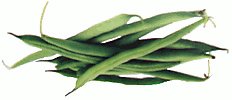Selection and storage

Raw fresh green beans, also called snap beans or French beans, should be tender, long, stiff, but flexible and give a snap sound when broken. Buy them from organic stores for their delicious beany flavor.
Avoid limp or over-matured beans with tough skin.
To store, place them in a perforated plastic bag and keep them in the refrigerator set at high relative humidity. They keep well for up to a week.
Preparation and serving methods
Wash raw beans in cold water. Just before using, remove the strings and trim the ends.
Here are some serving tips:
-
Green beans are among the most sought after vegetables in stir-fry, stews, grilled-salads, steamed along with carrots,
cauliflower, peas, tomato, etc. -
They mix well with cheese, nuts, mushroom, seafood, meat, etc.
-
In Asian regions, they are used in curries, soups, stir-fry with rice (rice pilaf), etc.
Safety profile
Green beans contain oxalic acid, a naturally-occurring substance found in some vegetables which, may crystallize as oxalate stones in the urinary tract in some people. Individuals with a known history of oxalate urinary tract stones are advised against eating vegetables belonging to
Brassica and Fabaceae family. Adequate intake of water is, therefore encouraged to maintain normal urine output to minimize the stone risk. (Medical disclaimer).
Also read ≻≻-
≻≻-Lima beans nutrition facts and health benefits.
≻≻-Fava beans nutrition facts and health benefits.
≻≻-Yard-long beans nutrition facts and health benefits.
≻≻-Snap peas nutrition facts and health benefits.
≻≻-Back to Vegetables from Green beans nutrition. Visit here for an impressive list of vegetables with complete illustrations of their nutrition facts and
health benefits.
≻≻-Back to Home page.
Further reading:
-
Refer Stanford School of Medicine Cancer information Page- Nutrition to Reduce Cancer Risk (Link opens in new window).
-
The journal of nutrition by JN- The Journal of Nutrition. (Link opens in new window).

